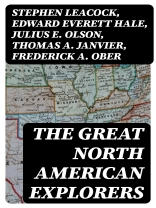The Great North American Explorers is an exemplary anthology that traverses the rich tapestry of North America’s exploration narratives. This collection amalgamates a diverse range of literary styles, from vivid, descriptive storytelling to reflective historical analysis, encapsulating the essence of discovery and adventure. Readers will find themselves ensnared by the riveting tales of exploration and pioneering spirit that capture the vast and untamed landscapes of North America and the indomitable courage of those who dared to traverse them. With a significance that reverberates through both historical and literary realms, this anthology is an indispensable archive of the North American experience. The compendium hosts an array of eminent authors whose collective works provide profound insights into the exploration ethos that shaped a continent. Stephen Leacock, Edward Everett Hale, and their fellow contributors are united in their devotion to illuminating the complexity and dynamism of the region’s history. Their combined voices draw from a wealth of historical and literary movements, crafting narratives that reflect and celebrate diverse cultural influences, pioneering attitudes, and the relentless human quest for discovery. The editors have masterfully woven these threads together, creating a cohesive and enlightening narrative. For readers seeking an enriched understanding of North American exploration, this anthology offers a unique confluence of perspectives. It presents an unparalleled opportunity to explore multifaceted insights into the explorers’ experiences and contributions. The readers will be inspired by the anthology’s capacity to foster dialogue across time and space, granting access to an educational treasure trove of literary and historical significance. A journey through The Great North American Explorers promises an expansive exploration where history and narrative meld into a compelling odyssey.
Tentang Penulis
Stephen Butler Leacock (1869–1944) was a Canadian teacher, political scientist, writer, and humorist. Born in Swanmore, England, Leacock emigrated to Canada with his family at a young age and grew up on a farm in Ontario. He attended the University of Toronto, earning a degree in classics, and later obtained his Ph D in political economy from the University of Chicago. Leacock is best known for his light humour and satire, qualities that pervaded his numerous works and endeared him to readers. His sharp wit and insightful social commentary were exhibited in his journalism as well as his fiction. Arguably, Leacock’s most famous work is ‘Sunshine Sketches of a Little Town’ (1912), which humorously depicts life in small-town Canada. His literary style combined both literary criticism with the anecdotal and narrative forms of traditional storytelling, often focusing on the inconsistencies and peculiarities of everyday life. In addition to his humoristic works, Leacock also authored more serious social commentaries and explorations into history, such as his work ‘The Great North American Explorers, ‘ where he delves into the narratives of those who navigated and mapped the vast expanse of the North American continent. Although less celebrated today than during his lifetime, Leacock remains an influential figure in Canadian literature and his contributions to the field of humor writing are considered seminal within the genre.












